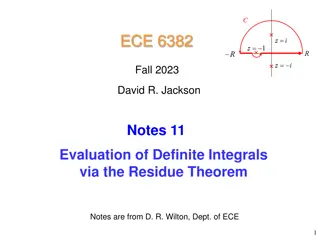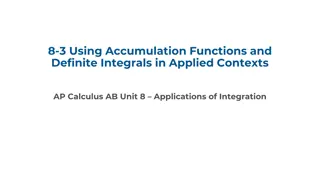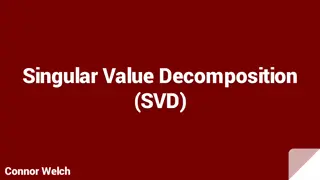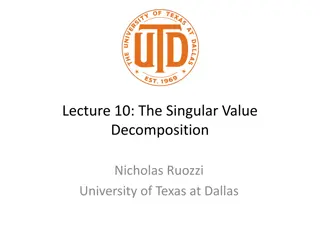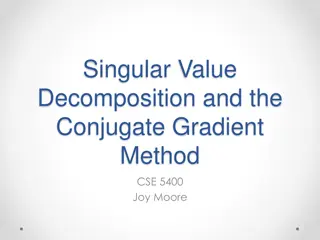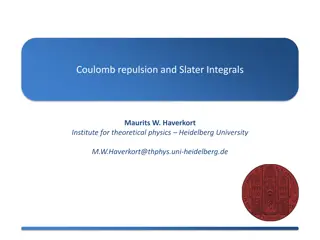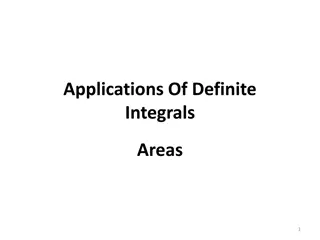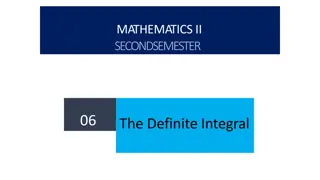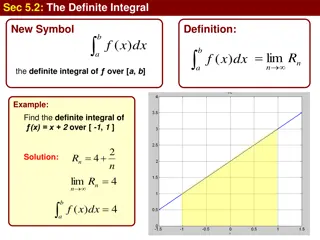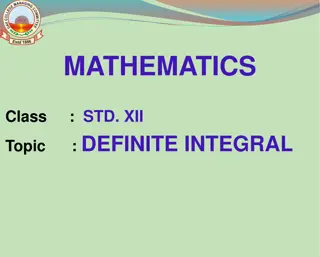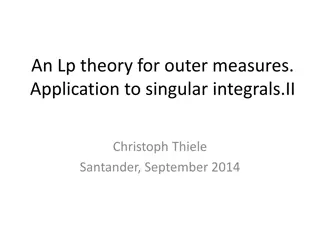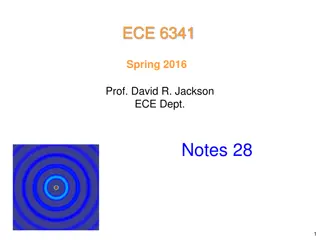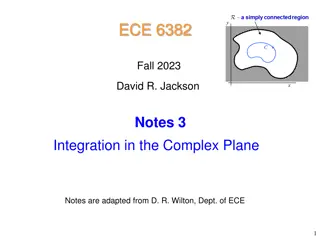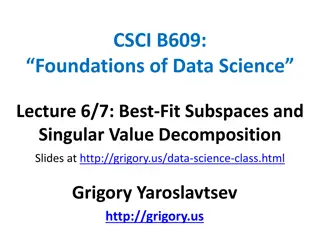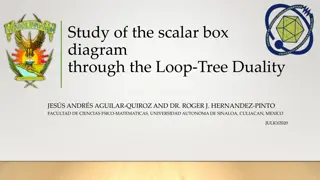Review of Definite Integrals using the Residue Theorem
Singular integrals involving logarithmic and non-integrable singularities are discussed, emphasizing integrability in the principal value sense. Cauchy Principal Value integrals and examples of their evaluations for singularities like 1/x are explored, highlighting the necessity of passing through t
2 views • 48 slides
Learn Plural and Singular Forms with Animals in English
This lesson focuses on differentiating between plural and singular forms using animals as examples. Students will learn to write sentences using "They're" for plural and "It's a" for singular, while looking at pictures of various animals. By the end of the lesson, students will be confident in using
4 views • 6 slides
Accumulation Problems and Definite Integrals in Applied Calculus
Explore the interpretation of definite integrals in accumulation problems, where rates of change are accumulated over time. Learn how to solve accumulation problems using definite integrals and avoid common mistakes by understanding when to use initial conditions. Discover the relation between deriv
0 views • 9 slides
Singular Value Decomposition (SVD)
Singular Value Decomposition (SVD) is a powerful method for solving systems of linear equations or matrices that are singular or close to singular. When LU-decomposition or Gaussian elimination fail, SVD provides a stable matrix decomposition helpful in various applications. It is particularly usefu
3 views • 17 slides
Singular Value Decomposition
The Singular Value Decomposition (SVD) is a powerful factorization method for matrices, extending the concept of eigenvectors and eigenvalues to non-symmetric matrices. This decomposition allows any matrix to be expressed as the product of three matrices: two orthogonal matrices and a diagonal matri
2 views • 35 slides
Singular Value Decomposition and the Conjugate Gradient Method
Singular Value Decomposition (SVD) is a powerful method that decomposes a matrix into orthogonal matrices and diagonal matrices. It helps in understanding the range, rank, nullity, and goal of matrix transformations. The method involves decomposing a matrix into basis vectors that span its range, id
6 views • 21 slides
Singular and Plural Nouns
Singular and plural nouns can sometimes be confusing, but this guide clears up common misconceptions. Learn when to use plural nouns for singular items, how certain nouns can be singular or plural, and when to use singular or plural verbs with specific nouns like sports teams or companies. Recognize
7 views • 9 slides
Subject-Verb Agreement
Master the rules of subject-verb agreement for singular and plural subjects, irregular verbs like be, have, and do, and compound subjects. Learn how to match singular subjects with singular verbs and plural subjects with plural verbs, and understand verb forms for different scenarios. Explore exampl
4 views • 40 slides
Singular and Plural Indefinite Pronouns
Explore the difference between singular and plural indefinite pronouns with examples. Learn about singular indefinite pronouns like 'each' and 'nobody', plural ones such as 'several' and 'few', and those that can be both singular and plural like 'some' and 'all'.
4 views • 5 slides
Coulomb Repulsion and Slater Integrals
Dive into the intricate world of Coulomb repulsion and Slater integrals, essential concepts in quantum physics. Explore the challenges posed by the diverging Coulomb integral and the complex calculations required to evaluate these interactions. Discover how Slater integrals play a crucial role in cr
4 views • 14 slides
Applications of Definite Integrals in Finding Areas
Explore the practical applications of definite integrals through the concept of finding areas. These images illustrate how definite integrals are used to calculate areas bounded by curves and lines, offering a visual representation of the integral calculus in action.
1 views • 9 slides
Properties of Definite Integrals in Mathematics II Second Semester
Delve into the world of definite integrals in Mathematics II Second Semester, understanding rules, properties, and applications through examples. Learn to find bounds, evaluate integrals, calculate areas under curves, and graph functions for a comprehensive understanding of this mathematical concept
3 views • 15 slides
Definite Integrals in Calculus
Explore the concept of definite integrals in calculus, including their new symbol definition, area interpretation, and examples of evaluating integrals in terms of areas. Learn about the limits of integration, the procedure of integration, and how definite integrals can represent areas under curves.
4 views • 34 slides
Definite Integrals Using Graphing Display Calculator for Evaluation
Learn how to use a Graphing Display Calculator (GDC) to evaluate definite integrals step-by-step. Follow the instructions provided in the images to input the function and calculate the result with the GDC. This interactive process helps in understanding how technology can assist in mathematical comp
1 views • 17 slides
Definite Integrals in Mathematics
Explore the concept of definite integrals in mathematics, covering properties, solving methods, and applications in finding areas bounded by curves. Prior knowledge of functions, limits, derivatives, and indefinite integrals is essential to grasp this topic effectively. Dive into the unique value of
1 views • 32 slides
Singular and Plural Numbers in English Grammar
Explore the concept of singular and plural numbers in English grammar. Learn about the rules for converting singular nouns to plural, including adding "-s" and "-es" as suffixes. Discover exceptions to the rules and when to use them. Enhance your knowledge of English grammar with practical examples
1 views • 27 slides
An Lp Theory for Outer Measures and Applications to Singular Integrals II
This content delves into the theory of outer measures, focusing on its application to singular integrals. It covers topics such as Carleson boxes, outer measures on the upper half-plane, sizes of functions on tents, outer essential supremum spaces, Lp spaces, embedding theorems, and weak L1-Sinfty e
2 views • 34 slides
Asymptotic Evaluation Techniques in Integral Calculus
Learn about asymptotic evaluation of integrals through techniques like integration by parts and the stationary-phase method. Understand how to handle integrals involving real functions, and grasp the significance of concepts like the Riemann-Lebesgue lemma and small o notation. Delve into the physic
3 views • 21 slides
Mastering Subject-Verb Agreement for Better Writing
Learn how verbs should agree with their subjects in number, whether singular or plural. Understand the difference between singular and plural verb forms with examples. Discover when to use singular verb forms (ending in "s") with singular subjects like "he," "she," or "it," and when to use plural ve
0 views • 9 slides
Advanced Quantum Chemistry: Solving Secular Determinants and Integrals
Lecture 3 delves into secular determinants, overlap, resonance, and Coulomb integrals, introducing the Hückel approximation method for molecular orbital calculations in inorganic and solid-state chemistry. The lecture explains the approximations made, simplifying the calculation of integrals and en
1 views • 20 slides
Singular or Plural Nouns, Usage Tips and Examples
Learn about singular and plural nouns in English, including nouns used only in plural, nouns ending in 's' but not plural, singular nouns with plural verb usage, common examples, and how to use plural nouns with singular verbs for money, time, and distance. Understand when to use 'a pair of' with ce
0 views • 9 slides
Singular and plural
Nouns can be written in the singular or plural form, indicating one or more instances respectively. Explore examples like "one rabbit" versus "lots of rabbits" to grasp the concept effectively. Learn more about how "one key" transforms into "lots of keys" and other fascinating singular-plural pairs.
2 views • 5 slides
Singular and plural
This content includes images and examples to help learners understand singular and plural forms of words like cars, pencils, boys, animals, objects, and more. The visuals and text provide a clear demonstration of how singular nouns change to become plural, making it easier to grasp the concept.
2 views • 9 slides
Singular and plural
In this content, you will find examples of singular and plural nouns illustrated with images. From cars to pencils, the concept is demonstrated clearly. Explore the differences between singular and plural forms through engaging visuals. Enhance your understanding of grammar with this visual guide.
2 views • 9 slides
Integration in the Complex Plane: Definitions and Equivalences
Learn about line integrals in the complex plane, equivalence between complex and real line integrals, and review of line integral evaluation. Understand how to evaluate line integrals using parameterization and examples.
1 views • 53 slides
Mastering Singular Subjects in Grammar
Learn about singular subjects in grammar, including nouns that are singular in form and meaning despite appearing plural, such as statistics versus statistics, and how to correctly pair them with singular or plural verbs. Understand how words like measles, economics, and eyeglasses affect subject-ve
10 views • 6 slides
Singular and Plural Nouns in English
Learn how to differentiate between singular and plural nouns in English grammar with examples and explanations. Discover when to use plural verbs with singular nouns and vice versa. Explore common exceptions and guidelines for using singular and plural forms correctly in sentences.
0 views • 9 slides
Tutorial for Multiloop Calculations: Master Integrals & Automated Solutions
Learn about multiloop calculations in theoretical physics with a tutorial by Marvin Schnubel. Discover the step-by-step process of reducing to master integrals, creating diagrams, IBP reduction, and solving integrals with automated tools. Find out how to generate expressions and handle complex compu
2 views • 9 slides
Proper Usage of Articles in English Grammar
Learn when to use the articles "a," "an," and "the" in English grammar to distinguish between specific and non-specific nouns. "A" is used for non-specific singular countable nouns, "an" before singular countable nouns starting with a vowel sound, and "the" for specific or known nouns, both singular
2 views • 5 slides
Singular Value Decomposition and Best-Fit Subspaces Overview
Explore the concepts of Singular Value Decomposition (SVD) and Best-Fit Subspaces in data science, including finding optimal subspaces and minimizing distances using SVD techniques like greedy strategy and projections. Learn about singular values vs. eigenvalues and constructing singular vectors for
4 views • 28 slides
Study of Scalar Box Diagram via Loop-Tree Duality Theorem
Explore the analysis of the scalar box diagram using the Loop-Tree Duality theorem to understand the origins of singularities. The work delves into N-particle scalar one-loop integrals, massless scalar box integrals, dual representations, and parametrization of momenta to compute integrals efficient
4 views • 14 slides
Reducing Feynman Integrals Using Blade in Collider Physics Workshop
Exploring the reduction of Feynman integrals using advanced techniques like Blade in the context of collider physics. This presentation covers perturbative calculations, IBP reduction, algorithms, examples, and the significance of reducing integrals for precise predictions in high-energy physics.
0 views • 29 slides
Advanced Techniques in Loop Corrections and Integral Reduction
Explore cutting-edge algorithms and methodologies for computing loop corrections, dimensional regularization, graph generation, integral reduction, and more in high-energy physics calculations. Learn about integration-by-parts identities, reduction of loop integrals to master integrals, and advanced
1 views • 21 slides
Definite Integrals in Mathematics
Explore the concept of definite integrals in mathematics, including properties, solving methods, and application in finding areas bounded by curves. Prior knowledge in functions, limits, derivatives, and continuous functions is essential for understanding definite integrals.
2 views • 32 slides
Understanding Double Integrals in Mathematics
Learn about double integrals, their application in calculating volumes of three-dimensional solids, and how they are used to evaluate regions in the xy-plane. Explore exercises and definitions related to double integrals, along with Fubini's theorem and the concept of iterated integrals.
0 views • 6 slides
Integral Antiderivatives and Properties Overview
Understand the fundamental theorems, standard integrals, and properties of antiderivatives. Explore how integrals can define new functions and learn about the differentiation of functions defined by integrals.
2 views • 4 slides
Definite Integrals: Understanding Calculations and Applications in Mathematics
Explore the concept of definite integrals through topics like pre-requisite knowledge, area calculations, definite integral of a function, and applications in mathematics. Gain insights into the fundamentals of integrals and their practical uses in various scenarios.
0 views • 14 slides
Understanding Definite Integrals and Their Properties
Explore the concept of definite integrals, rules satisfied by them, and examples of evaluating integrals. Learn about the symbol notation, theorem related to antiderivatives, and properties such as zero width interval, constant multiple, sum, difference, and additivity. Practice solving integral pro
1 views • 13 slides
Understanding Singular Value Decomposition (SVD) and Principal Component Analysis (PCA)
Learn about Singular Value Decomposition (SVD) and Principal Component Analysis (PCA) techniques for matrix analysis, including the process of eigenvector-eigenvalue decomposition, application of SVD to non-square matrices, and calculation of important components. Explore the steps involved in SVD,
0 views • 64 slides
Understanding Multiple Integrals for T.Y.B.Sc. Students
Explore the concepts of multiple integrals in this chapter, extending from definite integrals to double and triple integrals of functions in two or three variables. Learn about volumes, masses of regions, using polar coordinates, and coordinate systems in three-dimensional space for simplifying trip
1 views • 36 slides
